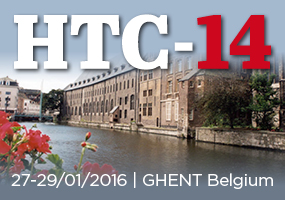SEMINAR 1: POSTNOVA ANALYTICS
Title: Field-Flow Fractionation and Size Exclusion Chromatography: High resolution separation techniques for the comprehensive characterization of Proteins, (Bio)Polymers and Nanoparticles
Presenters: Gerhard Heinzmann & Florian Meier, Postnova Analytics, Germany
Room: Rector Vermeylen, 2nd floor
Postnova Analytics is inventor of Field Flow Fractionation (FFF) for nanoparticle, protein and bio/polymer separation, fractionation and characterization. Postnova offers a complete FFF product range for applications in Biopharmaceutical, Nanotechnology, Environmental, Food, Cosmetics and Polymers. FieldFlow Fractionation coupled to Multi-Angle Light scattering (MALS), Dynamic Light Scattering (DLS) and ICP-MS detection offers access to high resolution size and molar mass separation, characterization and element speciation.
Products are CentrifugalFFF for Nanoparticles, FlowFFF for Biopharmaceuticals and ThermalFFF for Polymers. All FFF systems are controlled by the powerful and user friendly NovaFFF software platform. The new Postnova FFF product line is a milestone regarding the Field Flow Fractionation technology that enables a broad range of researchers from polymer, material, environmental and biosciences and nanotechnology to make use of this powerful separation technology.
The Field Flow Fractionation systems from Postnova Analytics can easily be coupled with MALS Multi-Angle Light Scattering and DLS Dynamic Light Scattering. With the AF2000-MALS-DLS-system absolute molar mass and particle size can be measured without the need of a calibration standard. Furthermore the Field Flow Fractionation systems from Postnova Analytics can be coupled to ICP-MS systems. With this hyphenated technique direct element speciation after the separation process is possible.
SEMINAR 2: SCIEX SEPARATIONS
Title: Hyphenation of low flow separations to Mass Spectrometry
Room: Rector Blancquaert, 3rd floor
Part 1 - CESI-MS for Characterization of Intact Proteins
Govert W. Somsen, VU Amsterdam, The Netherlands
Mass spectrometry (MS) preceded by integrated capillary electrophoresis electrospray ionization (CESI) offers attractive possibilities for intact protein analysis. It provides the high selectivity and sensitivity required to distinguish structurally related proteoforms. CESI presents a significant enhancement in signal-to-noise ratio, yielding protein detection limits in the sub-nM range. In this presentation the usefulness of CESI-MS will be demonstrated by the characterization of drug-protein conjugates, therapeutic glycoproteins, nanobodies, and monoclonal antibodies. CESI-MS is shown to provide detailed drug-protein, glycoform and impurity profiles, allowing assignment of up to 250 isoforms per protein in a single run.
Part 2 - Improving Sensitivity in Bioanalysis using Trap-and-Elute MicroLC-MS
Eike Logé, SCIEX Germany
Bioanalysis in biological fluids is important during all stages of drug development. While traditionally immunoassays are used, more recently LC-MS has been adopted because of its high selectivity, accuracy, and precision. As the amount of sample that can be drawn from a small animal during DMPK studies is limited, sensitivity of an LC-MS based method becomes very important. MicroLC is becoming a compelling alternative to conventional HPLC because of the sensitivity improvement it can offer when coupled with MS. When injecting similar volumes as typically injected in conventional HPLC, throughput is sacrificed because of the time it takes to load the sample onto the column using flow rates as low as 5 µL/min. In this presentation we describe an on-line pre-concentration MicroLC method that allows for loading sample at flow rates of 35 µL/min or higher on a short trap column, while performing the LC-MS analysis at much lower flow rates to achieve the highest sensitivity possible.
SEMINAR 3: WATERS CORPORATION
Title: Ion Mobility and REIMS Ionisation Technology - A New Road To Analytical Success
Presenter: Eric Van Beelen, Waters SAS, France
Room: Refter, ground floor
Rapid Evaporative Ionisation Mass Spectrometry (REIMS) combined with multivariate statistical analysis (Principal Component Analysis and Linear Discriminate Analysis) is an emerging technique for near real time characterization of tissues with no requirement for sample preparation. This ultra fast analysis tool can accurately and reproducible discriminate samples within a few seconds regardless of the chosen tissue . Several examples will be given to shown the power of this analytical technique in food adulteration.
Ion mobility mass spectrometry is an analytical technique that separates gas-phase ions based on their size and shape, analogous to electrophoresis in the condensed phase. It can act as a tool to separate complex mixtures, to resolve ions that may be indistinguishable by mass spectrometry alone, or to determine structural information (CCS-values), complementary to more traditional structural approaches. Ion Mobility mass spectrometry will give additional confirmation and certainty for identification of compounds in routine chromatographic analysis as is shown in this presentation.



